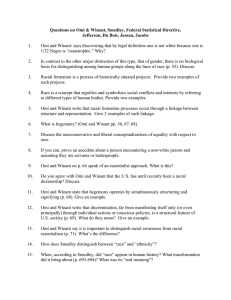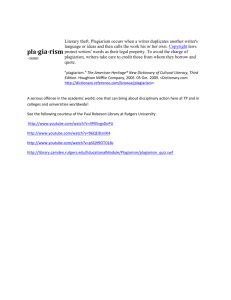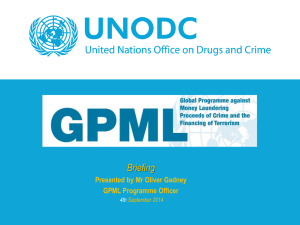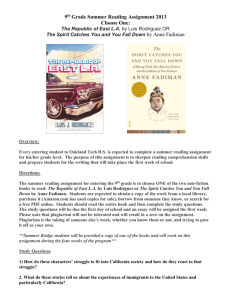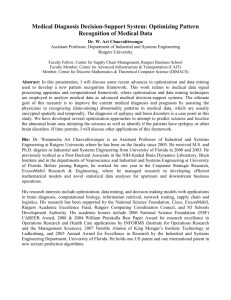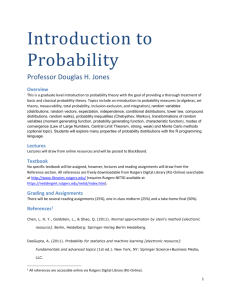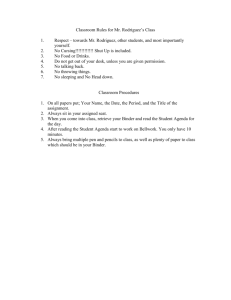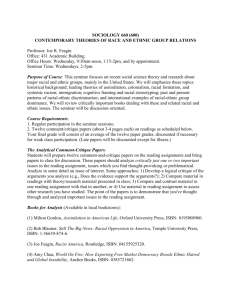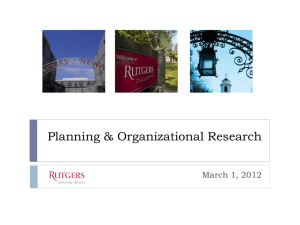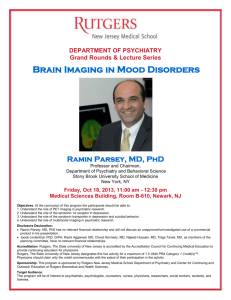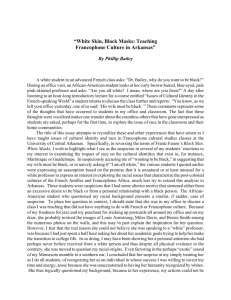RACE MATTERS
advertisement
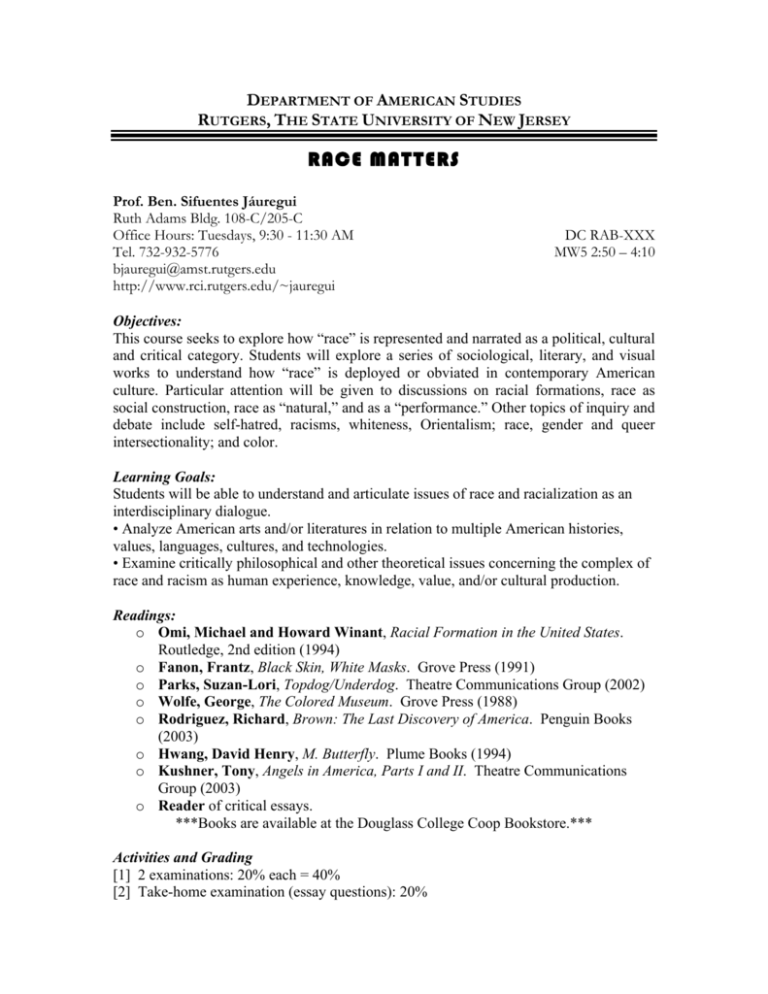
DEPARTMENT OF AMERICAN STUDIES RUTGERS, THE STATE UNIVERSITY OF NEW JERSEY RACE MATTERS Prof. Ben. Sifuentes Jáuregui Ruth Adams Bldg. 108-C/205-C Office Hours: Tuesdays, 9:30 - 11:30 AM Tel. 732-932-5776 bjauregui@amst.rutgers.edu http://www.rci.rutgers.edu/~jauregui DC RAB-XXX MW5 2:50 – 4:10 Objectives: This course seeks to explore how “race” is represented and narrated as a political, cultural and critical category. Students will explore a series of sociological, literary, and visual works to understand how “race” is deployed or obviated in contemporary American culture. Particular attention will be given to discussions on racial formations, race as social construction, race as “natural,” and as a “performance.” Other topics of inquiry and debate include self-hatred, racisms, whiteness, Orientalism; race, gender and queer intersectionality; and color. Learning Goals: Students will be able to understand and articulate issues of race and racialization as an interdisciplinary dialogue. • Analyze American arts and/or literatures in relation to multiple American histories, values, languages, cultures, and technologies. • Examine critically philosophical and other theoretical issues concerning the complex of race and racism as human experience, knowledge, value, and/or cultural production. Readings: o Omi, Michael and Howard Winant, Racial Formation in the United States. Routledge, 2nd edition (1994) o Fanon, Frantz, Black Skin, White Masks. Grove Press (1991) o Parks, Suzan-Lori, Topdog/Underdog. Theatre Communications Group (2002) o Wolfe, George, The Colored Museum. Grove Press (1988) o Rodriguez, Richard, Brown: The Last Discovery of America. Penguin Books (2003) o Hwang, David Henry, M. Butterfly. Plume Books (1994) o Kushner, Tony, Angels in America, Parts I and II. Theatre Communications Group (2003) o Reader of critical essays. ***Books are available at the Douglass College Coop Bookstore.*** Activities and Grading [1] 2 examinations: 20% each = 40% [2] Take-home examination (essay questions): 20% Race - 2 [3] Final essay (6-8 pages): 25% [5] Class attendance and participation: 15% ♦ Class attendance is fundamental to getting a good grade; furthermore, participation is required. Students are encouraged to engage in all class and group discussions, if not with commentary on the reading material, certainly by asking questions. This course is designed for intellectual exchange: every student is responsible for reading and preparing the assigned texts before class meetings. All discussions or interventions will be made individually, in pairs or small groups. Remember: not staying on top of the reading is unfair to your classmates who depend on your participation. ♦ All papers and exams must be turned in on time; no material will be accepted late unless accompanied by a letter from the Dean’s Office, or other appropriate documentation. ♦ The professor reserves the right to give impromptu quizzes during the semester. Grading Scale: 92100=A; 8791=B+; 8186=B; 7780=C+; 7076=C; 6069=D; 059=F Office hours: Students are strongly advised to consult with the professor about any problems that might arise regarding any text, ideas for final essay, presentations, etc. Office hours are Tuesdays between 9:30 AM and 11:30 AM—or by appointment. Do not bottle up all questions for the session before the exams or essays. Academic Integrity: Except for collaborative assignments officially approved by the instructor in advance, all work that a student submits must be his/her own independent effort. Students must cite properly all outside sources consulted in preparing written assignments. Students should review the university policy on Academic Integrity (see the website for the Teaching Excellence Center: http://teachx.rutgers.edu/integrity/policy.html). The Writing Program maintains a web site that defines and discusses plagiarism: http://wp.rutgers.edu/courses/201/plagiarism_policy/. This site clarifies many issues regarding the University’s policy on academic integrity. Failure to comply with this policy can result in failure of the course. This course will require supplementary research. Remember that Plagiarism is the representation of the words or ideas of another as one’s own in any academic exercise. To avoid plagiarism, every direct quotation must be identified by quotations marks or by appropriate indentation and must be properly cited in the text or in a footnote. (cited from University Regulations) Any questions about what constitutes plagiarism should be discussed with the faculty member. For information on proper documentation, consult “Acknowledging Sources,” the guide prepared by the Rutgers American Studies Department, which will be distributed in class. If you have further doubts regarding citation, please consult the MLA Handbook for Writers of Research Papers (6th Ed.) to resolve any problem. Prof. Sifuentes-Jáuregui has a copy available for reference. Race - 3 An excellent primer on citing sources is available on the American Studies webpage: http://amerstudies.rutgers.edu/documents/AkcnowldgingSources.pdf Race - 4 RACE Date Topic Assignment January 19 Introduction Discussion of MLK’s “I Have a Dream” Speech Racial Formation – Definitions Omi/Winant, Racial Formation, Part I, pp. 1-50 24 26 Omi/Winant, Racial Formation, Part II, pp. 53-91 31 Omi/Winant, Racial Formation, Part III and Conclusion, pp. 95-159 February 2 Doubleconsciousness 7 DuBois selection, “Of Our Spiritual Strivings” in The Souls of Black Folk Fanon, Black Skin, White Masks, pp. 7-108 9 Fanon, Black Skin, White Masks, pp. 109-140 “Look, a Negro!” 14 Fanon, Black Skin, White Masks, pp. 141-232 16 Exam #1 21 Black-face 23 Black Faces 28 March 2 Discussion of Spike Lee’s Bamboozled [The movie will be screened the week prior] Wolfe, The Colored Museum Wolfe, The Colored Museum Race and Brotherhood 7 Parks, Topdog/Underdog Parks, Topdog/Underdog 9 Take-Home Exam Due Spring Break 21 23 Coloring Rodriguez, Brown, pp. 1-79 Rodriguez, Brown, pp. 81- 167 Race - 5 28 30 Rodriguez, Brown, pp. 169-230 Oriental Fashionings April 4 6 Hwang, M. Butterfly, Acts 2 & 3, and “Afterword” Whiteness Austin, “Performative Utterances” Butler, “”Burning Acts” Exam #2 Desire In-class screening of Scott McGhee’s Suture 11 13 18 Discussion of Suture 20 Queer Cultures and Race 25 Putting it all together… 27 May 2 Said selection, “Introduction” from Orientalism Hwang, M. Butterfly, Act 1 J. Rodriguez, “Queer Latinidad” (selection) McBride, “Why I Hate Abercrombie & Fitch” [One-page proposal of final essay due] Kushner, Angels in America, Part I Kushner, Angels in America, Part II Kushner, Angels in America, conclusion Final Essay Due
